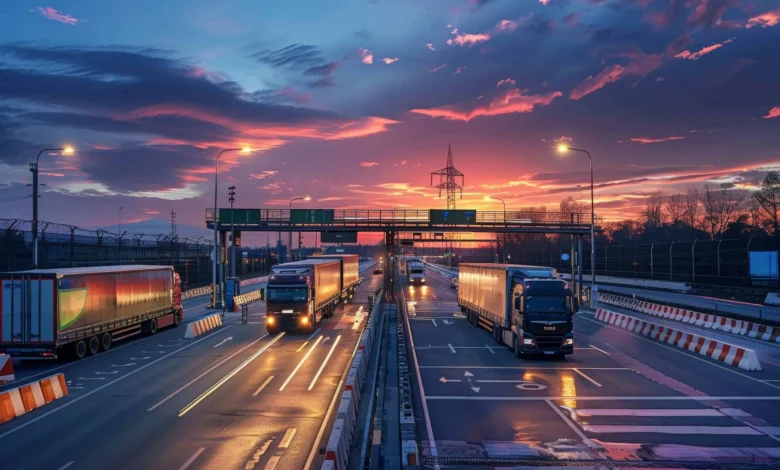Unlocking the Supply Chain Symphony: How Transportation and Logistics Software Development Orchestrates Global Commerce

The intricate ballet of modern commerce, the seamless flow of goods across continents, the precise choreography of trucks, trains, ships, and planes – all this is made possible by the power of software. Transportation and logistics software development is what powers this complex symphony, orchestrating the movement of goods, information, and resources that fuel the global economy. It’s not just about creating apps for tracking shipments; it’s about building the intelligent, interconnected systems that underpin the entire supply chain ecosystem. It’s about crafting the digital infrastructure that empowers businesses to optimize routes, manage fleets, streamline warehouses, predict demand, and connect all the moving parts of the intricate logistics puzzle.
Choosing the right partner for these services isn’t merely a technical decision; it’s a strategic imperative, a partnership that can determine your ability to compete and thrive in the increasingly interconnected global marketplace.
It’s also about leveraging the power of data, connectivity, and advanced analytics to create agile, resilient, and responsive supply chains. It’s about embracing proactive, data-driven decision-making that anticipates disruptions, optimizes resource allocation, reduces costs, enhances customer satisfaction, and drives sustainable growth.
The Evolving Landscape: Navigating the Complexities of Modern Logistics
The transportation and logistics industry is constantly changing because of disruptive technologies, shifting consumer expectations, increasing global interconnectedness, and evolving regulatory landscapes. Providers of transportation and logistics software development services must be able to navigate a complex web of challenges and opportunities, including:
- The E-commerce Revolution: The relentless growth of e-commerce has placed unprecedented demands on logistics providers, requiring them to deliver goods faster, cheaper, and with greater flexibility. This necessitates sophisticated software solutions that can handle the volume, velocity, and variability of e-commerce fulfillment.
- Global Supply Chain Complexity: Managing global supply chains involves navigating a labyrinth of regulations, coordinating with a multitude of stakeholders (suppliers, manufacturers, distributors, retailers, and customers), and dealing with the inherent uncertainties of international trade. Robust software is essential for managing this complexity and ensuring seamless collaboration across the supply chain.
- The Data Deluge: Modern logistics operations generate massive amounts of data, from real-time tracking information to warehouse inventory levels. Harnessing this data requires sophisticated analytics and reporting tools that can extract meaningful insights and inform strategic decision-making.
- The Demand for Real-Time Visibility: Businesses and consumers alike demand real-time visibility into the location and status of goods throughout the supply chain. This requires sophisticated tracking and monitoring systems that can provide end-to-end transparency.
- The Sustainability Imperative: Growing awareness of environmental issues is driving businesses to adopt more sustainable logistics practices. This requires innovative software solutions that can optimize fuel consumption, reduce emissions, and promote the use of eco-friendly transportation modes.
- The Rise of Automation: Automation is transforming the logistics industry, from automated warehouses to self-driving trucks. Software is the key to unlocking automation’s full potential, enabling businesses to streamline operations, reduce costs, and improve efficiency.
Beyond the Code: Essential Qualities of a Strategic Partner
Choosing the right provider of transportation and logistics software development services requires more than just evaluating their technical skills. Consider these crucial factors:
Deep Domain Expertise: A True Understanding of the Logistics Ecosystem
Look for a company that doesn’t just write code but also possesses a deep understanding of the transportation and logistics industry. They should be intimately familiar with the various transportation modes (trucking, rail, air, sea), the regulatory landscape, the unique challenges faced by different segments of the industry, and the evolving best practices for supply chain management.
A Collaborative Partnership: Working Together to Achieve Shared Goals
The ideal provider will act as a true partner, working closely with you to understand your business objectives, identify your pain points, and develop a customized solution that aligns with your specific needs. They should be proactive, communicative, transparent, and genuinely invested in your success.
A Focus on Innovation: Embracing the Future of Logistics
Choose a company that is not afraid to push boundaries and explore new technologies. It should actively research and implement emerging trends, such as artificial intelligence, machine learning, blockchain, IoT, and augmented reality, to develop innovative solutions that can give it a competitive edge and position it for future growth.
A Commitment to Quality and Scalability: Building Robust and Reliable Systems
Reliability and scalability are paramount in the transportation and logistics industry. Look for a provider with a proven track record of delivering high-quality software that can handle the demands of your operations, scale to accommodate future growth, and operate reliably in mission-critical environments. The provider should also have rigorous testing and quality assurance processes in place.
A Comprehensive Suite of Services: Meeting All Your Needs Under One Roof
A truly valuable partner will offer a comprehensive range of services, including:
- Business Analysis and Consulting: Helping you define your requirements, develop a strategic roadmap for your software project, and optimize your logistics processes.
- UI/UX Design: Creating intuitive and user-friendly interfaces that enhance the user experience for all stakeholders, from dispatchers to drivers to customers.
- Integration Services: Seamlessly integrating your new software with existing systems, such as ERP, CRM, warehouse management systems, and other third-party applications.
- Data Migration and Management: Migrating your data to the new system, ensuring its accuracy and integrity, and providing ongoing data management services.
- Training and Support: Providing comprehensive training for your team and ongoing support to ensure the successful adoption and utilization of the software.
- Maintenance and Upgrades: Providing continuous maintenance and regular updates to ensure that your software remains up-to-date and performs optimally.
Conclusion: Orchestrating the Future of Global Commerce
Choosing the right provider of transportation and logistics software development services is a strategic decision that can have a profound impact on your business’s success. It’s about finding a partner who not only has the technical expertise but also shares your vision for the future of global commerce. It’s about collaborating with a team that can help you navigate the complexities of the logistics landscape, unlock the full potential of your supply chain, and build intelligent, interconnected solutions that will drive your competitive advantage in the years to come. It’s about more than just building software; it’s about orchestrating the future of how goods move around the world.





